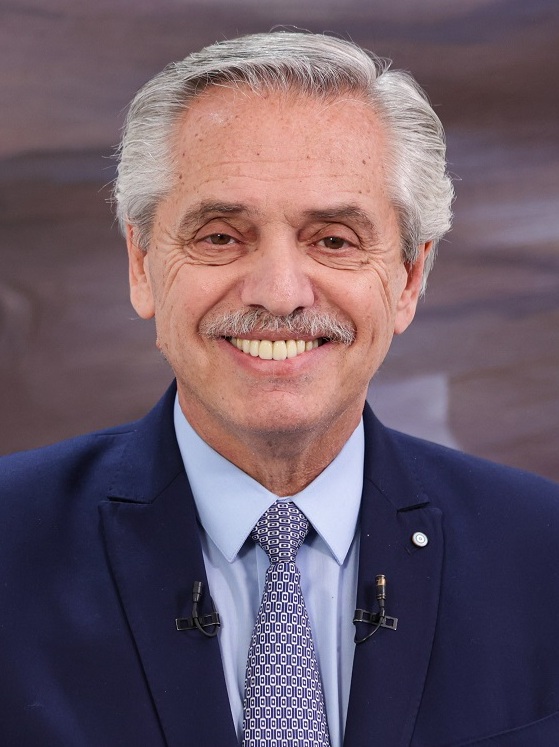Alberto Fernández
 Alberto Ángel Fernández (; born 2 April 1959) is an Argentine politician, lawyer, and academic who served as President of Argentina from 2019 to 2023. He was also the Chief of the Cabinet of Ministers from 2003 to 2008. His tenure as Cabinet Chief remains the longest since the post was created in 1994.
Alberto Ángel Fernández (; born 2 April 1959) is an Argentine politician, lawyer, and academic who served as President of Argentina from 2019 to 2023. He was also the Chief of the Cabinet of Ministers from 2003 to 2008. His tenure as Cabinet Chief remains the longest since the post was created in 1994.Born in Buenos Aires, Fernández attended the University of Buenos Aires, where he earned his law degree at age 24, and later became a professor of criminal law. Ideologically a Peronist, entered public service as an adviser to Deliberative Council of Buenos Aires and the Argentine Chamber of Deputies. In 2003, he was appointed Chief of the Cabinet of Ministers, serving during the entirety of the presidency of Néstor Kirchner, and the early months of the presidency of Cristina Fernández de Kirchner.
A member of the Justicialist Party, a Peronist party, Fernández was the party's candidate for the 2019 presidential election under the leftist Frente de Todos alliance and defeated incumbent president Mauricio Macri with 48% of the vote. His political position has been described as left-wing. The first two years of his presidency was limited by the COVID-19 pandemic in Argentina, during which he imposed strict lockdown measures to suppress the spread of the disease, and a debt crisis inherited from his predecessor. While the economy recovered in 2021–22, inflation rose to 100% (the highest since 1991). His approval ratings have been constantly low throughout his presidency, only in few certain occasions over 50% approval rate, with disapproval ratings from 60% to 80%.
According to British newspaper ''The Economist'', Fernández was considered "a president without a plan", and his presidency to be a "weak administration", alluding to his lack of independent decision-making. Instead, his decisions were under heavy influence of Vice President and former President Cristina Fernández de Kirchner, also leader of the coalition, whom Fernández himself described as a "permanent source of consultation". In April 2023, Fernández announced that he decided to not seek reelection to the presidency in the 2023 presidential election. He was succeeded by Javier Milei on 10 December 2023. Leaving office with a disapproval rate of around 80%, Fernández is seen as one of the worst presidents in Argentine history. Provided by Wikipedia
-
1
-
2
-
3
-
4Digital revistaSCIELO
-
5Digital revistaSCIELO
-
6Digital revistaSCIELO
-
7Digital revistaSCIELO
-
8Digital revistaSCIELO
-
9conferenceObject bibliotecaUNC AR
-
10Digital revistaSCIELO
-
11Digital revistaSCIELO
-
12by Martín-Lagos-Maldonado,Alicia, Guilarte-López-Mañas,Julio, Benavente-Fernández,Alberto
Published 2017Digital revistaSCIELO -
13by Pérez-Fernández,Alberto, Rivas-Martínez,Mayra lliana, Caamal-Cauich,Ignacio, Martínez-Luis,David
Published 2017Digital revistaSCIELO -
14by Soto-Miranda,Miguel Ángel, Romero-y-Huesca,Andrés, Goné-Fernández,Alberto, Soto-González,Jaime
Published 2006Digital revistaSCIELO -
15by Vergara-Fernández,Alberto O, Quiroz,Erich F, Aroca,Germán E, Alarcón Pulido,Nelson A
Published 2008Digital revistaSCIELO -
16
-
17
-
18
-
19
-
20by Esteban-Fernández,Alberto, Coma-Canella,Isabel, Bastarrika,Gorka, Barba-Cosials,Joaquín, Azcárate-Agüero,Pedro M.
Published 2017Digital revistaSCIELO




